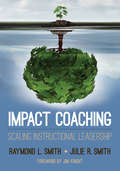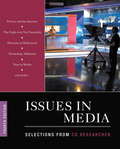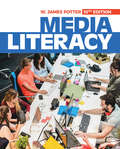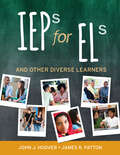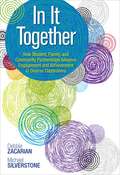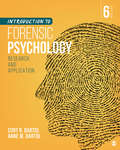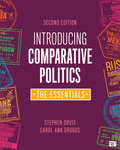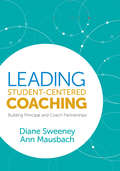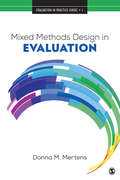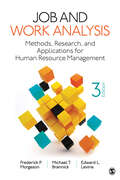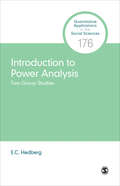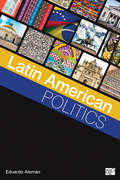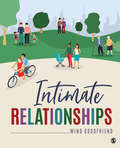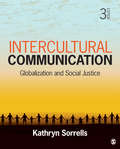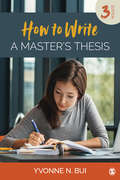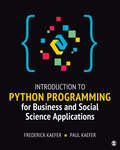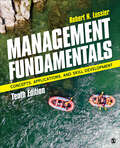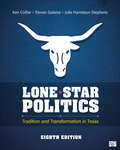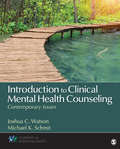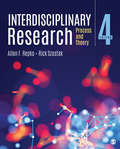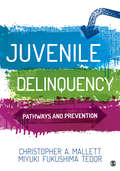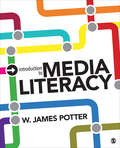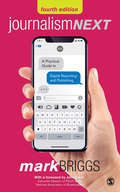- Table View
- List View
Impact Coaching: Scaling Instructional Leadership
by Raymond L. Smith Julie Rae SmithInvest in building talent. The best principals don’t just happen. When new principals are handed the keys and left to make decisions about their schools without adequate, sustained support, what happens? Too often, school improvement efforts don’t gain full traction, principals often give up and leave and real student gains remain out-of-reach. Impact Coaching bucks the notion of leaving principals to learn the ropes on their own. This book offers a solid, sustainable, and laser-sharp focus on instructional leadership and helps leaders hone, model and lead new learning through deliberate practice by: Engaging in rich, rigorous, and reflective open-to-learning conversations with both coaches and colleagues to improve instructional leadership practices Leveraging their 5 Big Winner Practices for highest impact Using Linking Walk templates to apply new ideas to real scenarios that improve lead learner practices This book could be your single most impactful investment toward eventual student achievement. "The authors do a great job of sharing the benefits of coaching and elaborating on how the coaching partnership should and could look. The book is very relevant, clearly based on research, and has some great checklists to further clarify the recommended steps." –Kathy Rhodes, Principal Hinton Elementary, Hinton, IA "Impact Coaching provides school leaders with the tools to turn opportunity into action. Educational leaders possess an incredible capacity to influence the system and impact student learning. Ray and Julie Smith present strategies for focusing on leadership practices that maximize impact on student learning and achievement. This book will re-ignite your commitment to creating effective change, bolster your confidence to persist through challenges, and renew your motivation to reach your fullest potential. The authors will simultaneously inspire your soul and challenge your mind!" –Russell J. Quaglia, President/Founder Quaglia Institute for Student Aspirations
Issues in Media: Selections from CQ Researcher
by CQ ResearcherWhat is the future of television? Do social media and big data threaten privacy rights? Do children have too much access to violent media content? Is reporting on global conflict worth the risk? These questions—and many more—are at the heart of today’s media landscape. Written by award-winning CQ Researcher journalists, this collection of non-partisan reports focuses on fifteen hot-button issues impacting the media. With reports ranging from the fight over net neutrality to social media and politics, Issues in Media promotes in-depth discussion, facilitates further research, and helps readers formulate their own positions on crucial issues. And because it’s CQ Researcher, the reports are expertly researched and written, presenting readers with all sides of an issue. Key Features: Chapters follow a consistent organization, beginning with a summary of the issue, then exploring a number of key questions around the issue, next offering background to put the issue into current context, and concluding with a look ahead. A pro/con debate box in every chapter offer readers the opportunity to critically analyze and discuss the issues by exploring a debate between two experts in the field. All issues include a chronology, a bibliography, photos, charts, and figures to offer readers a more complete picture of the issue at hand.
Media Literacy
by W. James PotterMedia Literacy teaches students how to navigate through the overwhelming flood of information found in today’s media-saturated world. Drawing from thousands of media research studies, author W. James Potter explores key components to understanding the fascinating world of mass media. Potter presents examples and facts to help students understand how the media operate, how they attract attention, and how they influence the public. Chapters conclude with exercises to help readers apply the material to everyday life and improve their media literacy. The Tenth Edition integrates a stronger focus on digital media, features a streamlined organization, and updates facts to keep readers informed on the rapidly changing media phenomenon.
IEPs for ELs: And Other Diverse Learners
by James R. Patton John J. HooverDevelop and monitor high-quality IEPs for diverse learners High-quality IEPs are fundamental for guiding the educational process of and developing goals for students who require special education services. English learners (ELs) and other students with learning, emotional, or behavioral disabilities present unique challenges to educators responsible for referring, assessing, and placing them. IEPs for ELs provides educators with numerous research-based strategies and examples of how to write effective IEPs for these K-12 learners. John J. Hoover and James Patton, leading professionals in the areas of special education and linguistic diversity, share their research and how they have supported ELs who have, or are suspected of having, learning and intellectual disabilities. Readers will find: Practical guidance for developing and monitoring culturally and linguistically responsive IEPs Checklists, guides, and other reproducibles that support IEP development Case studies and vignettes highlighting examples of appropriate IEPs for diverse learners Filled with expert practical advice that covers the IEP process and walks the reader through the procedure for creating high-quality IEPs that take individual differences into account, this guide is essential for special educators and bilingual/EL specialists. "A major strength for this book is its unique tie to English learners, while providing a dual focus on IEP writing. This is a great tool to use when training new special education teachers and IEP facilitators. There are direct connections to writing legally defensible plans with a user-friendly focus on IEP writing. I see this book as a tool to support teachers and students in ensuring that language and cultural considerations are included when developing and updating individual plans." —Renee Bernhardt, Supervisor, Special Education Cherokee County School District, GA
In It Together: How Student, Family, and Community Partnerships Advance Engagement and Achievement in Diverse Classrooms
by Debbie Zacarian Michael A. SilverstoneHarness the power of teacher, student, school, family, and community partnerships to promote student success Teaching effectively in diverse classrooms has become more complex than ever. The authors of this practical, compelling, and inspiring book propose that understanding the spheres of influence that connect students with teachers, peers, family members, and the broader community significantly increases the odds that every student will succeed in school. In clear, practitioner-friendly language with examples from an inspiring range of K-12 educators, the authors explore how tapping into the rich resources of teachers, students, families, the school community and the community-at-large can make the work of learning more successful for all involved. Richly detailed vignettes and concrete, evidence-based strategies help you systematically: Build coalitions of support around learning and engagement Develop positive relationships with students, their families and their communities Foster positive, reciprocal partnerships Promote peer-to-peer relationship building Support students and families from marginalized populations Learn to draw from the rich resources found within your learning community to build bridges to academic success for all learners. This comprehensive book shows you how! "Building meaningful relationships in education can be difficult, particularly when the parties involved are different from one another in identity, experience, and other ways. As a result, although in principle collaborations and partnerships in education are universally lauded, in practice they are often ignored. What we need are examples of partnerships that work. In it Together by Debbie Zacarain and Michael Silverstone suggests productive ways to work with, learn from, and form authentic relationships with diverse communities. Combining their abundant experience in classrooms and schools, and using examples from caring teachers in diverse classrooms, the authors demonstrate what it means to really be "in it together." Teachers, administrators, and everyone who cares about the future of education in a diverse society will benefit from the strategies they suggest." —Sonia Nieto, Professor Emerita University of Massachusetts
Introduction to Forensic Psychology: Research and Application
by Anne M. Bartol Curtis R. BartolWritten by authors with extensive experience in the field and in the classroom, Introduction to Forensic Psychology: Research and Application, Sixth Edition demonstrates how to analyze psychological knowledge and research findings and apply these findings to the civil and criminal justice systems. Focusing on research-based forensic practice and practical application, the authors use real-life examples and case law discussions to define and explore forensic psychology. Students are introduced to emerging specializations within forensic psychology, including investigative psychology, family forensic psychology, and police and public safety psychology. Research related to bias, diversity, and discrimination is included throughout the text to give students a multicultural perspective that is critical to the successful practice of forensic psychology. Included with this title: Instructor Online Resources: Access online resources for this title via the password-protected Instructor Resource Site.
Introducing Comparative Politics: The Essentials
by Carol Ann Drogus Stephen Walter OrvisIntroducing Comparative Politics: The Essentials is focused on core concepts and the big picture questions in comparative politics—Who rules? What explains political behavior? Where and why? Stephen Orvis and Carol Ann Drogus demonstrate the strengths and weaknesses of commonly debated theories, structures, and beliefs and push students to apply their understanding. While detailed case studies can go in-depth on specific countries and political systems, this book distills its country material into the narrative, increasing global awareness, current-event literacy, and critical-thinking skills. Adapted from the authors’ Introducing Comparative Politics, Fifth Edition, The Essentials version offers the same framework for understanding comparative politics in a briefer format, allowing you to teach the course the way you want to teach it.
Leading Student-Centered Coaching: Building Principal and Coach Partnerships
by Diane Sweeney Ann MausbachEssential leadership moves for supporting instructional coaching in your school Strong leadership is essential in any successful instructional coaching effort. Leading Student-Centered Coaching provides principals and district leaders with the background, practices, and tools required for leading coaching efforts that have a profound and positive impact on student and teacher learning. Filled with practical ideas that school leaders can easily apply to their own school settings, this book includes: Tools and techniques for preparing a school for coaching, launching a coaching culture, and supporting coaches Leadership Moves sections that provide strategies for building principal and coach partnerships Richly detailed Lessons from the Field, based on the authors’ real-life experiences, that illustrate principal and coach collaboration Recommendations for coaches to use as they strive to increase their impact With a focus on the critical role of school leadership, this action-oriented guide provides the key ingredients for ensuring the success of school-based coaching initiatives. "Sweeney and Mausbach explore the necessary ingredients to a successful instructional coach partnership between the principal and the coaches. This is a must-read for building leadership teams implementing an instructional coach program" —Timothy S. Grieves, Chief Administrator Northwest Area Education Agency, IA "This book synthesized the work necessary of school leaders when working with the coach. As a principal who was a student-centered coach, this book has shown me how I can tweak the skills I learned and apply them with a leadership lens." —Kelly Neylon, Principal Meadowview School, Woodridge IL
Mixed Methods Design in Evaluation (Evaluation in Practice Series #1)
by Donna M. MertensIn this groundbreaking first volume of SAGE′s Evaluation in Practice Series, best-selling author Donna M. Mertens explores the meaning of mixed methods evaluation, its evolution over the last few decades, and the dominant philosophical frameworks that are influencing thought and practice in the field today. Four chapters explore evaluation of the effectiveness of interventions, development of instruments, systematic reviews, and policy evaluations, while an additional chapter covers evaluation approaches often required in specific contexts including gender responsive evaluations, needs assessment, and evaluations in conflict zones. Practical in nature, the book guides readers’ thinking about the design of mixed methods evaluations through the use of illustrative examples and explanations for further applications. SAGE’s Evaluation in Practice Series offers concise, practical books for students and professionals working as evaluators.
Job and Work Analysis: Methods, Research, and Applications for Human Resource Management
by Edward L. Levine Frederick P. Morgeson Michael T. BrannickJob and Work Analysis: Methods, Research, and Applications for Human Resource Management provides students and professionals alike with an in-depth exploration of job analysis. Job analysis encompasses a wide range of crucial topics that help us understand what people do at work and why. This one-of-a-kind text expertly unpacks the best job analysis methods and then illustrates how to apply these methods to solve some of the most common workplace problems. Readers will learn the best practices for helping people work smarter, improving hiring and training, making jobs safer, and providing a satisfying work environment. The new Third Edition includes new references, the latest research findings, and expanded discussions of competency models, teams, and O*NET.
Introduction to Power Analysis: Two-Group Studies (Quantitative Applications in the Social Sciences #176)
by E. C. HedbergIntroduction to Power Analysis: Two-Group Studies provides readers with the background, examples, and explanation they need to read technical papers and materials that include complex power analyses. This clear and accessible guide explains the components of test statistics and their sampling distributions, and author Eric Hedberg walks the reader through the simple and complex considerations of this research question. Filled with graphics and examples, the reader is taken on a tour of power analyses from covariates to clusters, seeing how the complicated task of comparing two groups, and the power analysis, can be made easy.
Latin American Politics
by Eduardo AlemanWhile it is true that poverty, political instability, and economic under-performance continue to be major problems in Latin America, the region has made substantial progress in raising standards of living and overcoming military authoritarianism. Latin American Politics reflects just how much the region has changed in the last two decades. Eduardo Alemán draws on contemporary research in comparative studies on institutions, elections, and public opinion to highlight the big questions that political scientists seek to answer today: What are the causes of political instability? What factors have influenced changes in economic and gender inequality? What are the implications of different political institutions for political outcomes?
Intimate Relationships
by Wind GoodfriendRecipient of a 2021 Most Promising New Textbook Award from the Textbook & Academic Authors Association (TAA) Intimate Relationships provides students with a comprehensive understanding of the science behind relationships using a modern approach. Award-winning teacher and author Wind Goodfriend integrates coverage of family and friendship relationships in context with research methods, open science, theories, and romantic relationships so that readers can learn about all types of relationships and their interactions, including conflict and the dark side of relationships. The text supports today′s students by frequently applying relationship theories to examples that can be found in popular culture, helping students see how psychology can apply to the world that surrounds them. Included with this title: The password-protected Instructor Resource Site (formally known as SAGE Edge) offers access to all text-specific resources, including a test bank and editable, chapter-specific PowerPoint® slides.
Intercultural Communication: Globalization and Social Justice
by Kathryn SorrellsWinner of the 2022 Textbook Excellence Award from the Textbook & Academic Authors Association (TAA) Intercultural Communication: Globalization and Social Justice introduces students to the study of communication among cultures within the broader context of globalization. Author Kathryn Sorrells highlights history, power, and global institutions as central to understanding the relationships and contexts that shape intercultural communication. Promoting critical thinking, reflection, and action, the text’s social justice approach equips students with the knowledge and skills to create a more equitable world through communication. The Third Edition includes new case studies, updated examples and statistics, and expanded discussions on timely topics, like the rise of ethnonationalism and white nationalism, and the impact of new media on global communication.
How to Write a Master′s Thesis
by Yvonne N. Bui"This is the best textbook about writing an M.A. thesis available in the market." –Hsin-I Liu, University of the Incarnate Word The Third Edition of How to Write a Master′s Thesis is a comprehensive manual on how to plan and write a five-chapter master’s thesis, and a great resource for graduate students looking for concrete, applied guidance on how to successfully complete their master′s degrees. While research methods and statistics courses may teach students the basic information on how to conduct research, putting it all together into a single project and document can be a challenge. Author Yvonne Bui demystifies this process by integrating the language learned in prerequisite methods and statistics courses into a step-by-step guide for developing a student′s own thesis or project.
Introduction to Python Programming for Business and Social Science Applications
by Paul Kaefer Frederick KaeferWould you like to gather big datasets, analyze them, and visualize the results, all in one program? If this describes you, then Introduction to Python Programming for Business and Social Science Applications is the book for you. Authors Frederick Kaefer and Paul Kaefer walk you through each step of the Python package installation and analysis process, with frequent exercises throughout so you can immediately try out the functions you’ve learned. Written in straightforward language for those with no programming background, this book will teach you how to use Python for your research and data analysis. Instead of teaching you the principles and practices of programming as a whole, this application-oriented text focuses on only what you need to know to research and answer social science questions. The text features two types of examples, one set from the General Social Survey and one set from a large taxi trip dataset from a major metropolitan area, to help readers understand the possibilities of working with Python. Chapters on installing and working within a programming environment, basic skills, and necessary commands will get you up and running quickly, while chapters on programming logic, data input and output, and data frames help you establish the basic framework for conducting analyses. Further chapters on web scraping, statistical analysis, machine learning, and data visualization help you apply your skills to your research. More advanced information on developing graphical user interfaces (GUIs) help you create functional data products using Python to inform general users of data who don’t work within Python. First there was IBM® SPSS®, then there was R, and now there′s Python. Statistical software is getting more aggressive - let authors Frederick Kaefer and Paul Kaefer help you tame it with Introduction to Python Programming for Business and Social Science Applications.
Management Fundamentals: Concepts, Applications, and Skill Development
by Robert N. LussierPacked with experiential exercises, self-assessments, and group activities, Management Fundamentals: Concepts, Applications, and Skill Development, Tenth Edition develops essential management skills students can use in their personal and professional lives. Bestselling author Robert N. Lussier uses the most current cases and examples to illustrate management concepts in today’s ever-changing business world. This fully updated new edition provides in-depth coverage of key AACSB topics such as diversity, ethics, technology, and globalization. New to this Edition: New Cases New and expanded coverage of important topics like generational differences, sexual harassment, AI, cybersecurity, entrepreneurial mindset, managing change, and emotional intelligence Fully updated Trends and Issues in Management sections in each chapter Hundreds of new examples, statistics, and references so your students are exposed to the latest thinking in management Key Features: Case studieshighlight contemporary challenges and opportunities facing managers at well-known organizations such as IKEA, LG, Alibaba, and Buc-ees. Trends and Issuessectionsexplore timely topics such as the changing nature of work, managing multiple generations, and virtual teams. Self-Assessmentshelp readers gain personal knowledge of management functions in the real world and provide opportunities for readers to learn about their personal management styles and apply chapter concepts. Skill Builder Exercisesdevelop skills readers can use in their personal and professional lives. Ideas on Management chapter-opening caseshighlight real companies and people and are revisited throughout the chapter to illustrate and reinforce chapter concepts. Case studiesask readers to put themselves in the role of a manager to apply chapter concepts and consider issues facing real organizations.
Introducing Comparative Politics: The Essentials
by Carol Ann Drogus Stephen Walter OrvisIntroducing Comparative Politics: The Essentials is focused on core concepts and the big picture questions in comparative politics—Who rules? What explains political behavior? Where and why? Stephen Orvis and Carol Ann Drogus demonstrate the strengths and weaknesses of commonly debated theories, structures, and beliefs and push students to apply their understanding. While detailed case studies can go in-depth on specific countries and political systems, this book distills its country material into the narrative, increasing global awareness, current-event literacy, and critical-thinking skills. Adapted from the authors’ Introducing Comparative Politics, Fifth Edition, The Essentials version offers the same framework for understanding comparative politics in a briefer format, allowing you to teach the course the way you want to teach it.
Lone Star Politics: Tradition and Transformation in Texas
by Ken Collier Steven E. Galatas Julie D. Harrelson-StephensIn Texas, myth often clashes with the reality of everyday government. Explore the state’s rich political tradition with the Eighth Edition of Lone Star Politics. Utilizing a comparative approach, the authors set Texas in context with other states′ constitutions, policymaking, electoral practices, and institutions as they delve into the evolution of its politics. Critical thinking questions and unvarnished Winners and Losers discussions guide students toward understanding Texas government and assessing the state′s political landscape. The Eighth Edition includes a brand-new chapter on Civil Rights and Civil Liberties, along with the "tried and true" updates in every chapter that highlight the push-pull relationship between the state, federal, and local governments.
Introduction to Clinical Mental Health Counseling: Contemporary Issues (Counseling and Professional Identity)
by Michael K. Schmit Joshua WatsonIntroduction to Clinical Mental Health Counseling presents a broad overview of the field of clinical mental health and provides students with the knowledge and skills to successfully put theory into practice in real-world settings. Drawing from their experience as clinicians, authors Joshua C. Watson and Michael K. Schmit cover the foundations of clinical mental health counseling along with current issues, trends, and population-specific considerations. The text introduces students to emerging paradigms in the field such as mindfulness, behavioral medicine, neuroscience, recovery-oriented care, provider care, person-centered treatment planning, and holistic wellness, while emphasizing the importance of selecting evidence-based practices appropriate for specific clients, issues, and settings. Aligned with 2016 CACREP Standards and offering practical activities and case examples, the text will prepare future counselors for the realities of clinical practice.
Interdisciplinary Research: Process and Theory
by Rick Szostak Allen F. RepkoInterdisciplinary Research: Process and Theory offers a comprehensive, systematic presentation of the interdisciplinary decision-making process by drawing on student and professional work from the natural sciences, social sciences, humanities, and applied fields. Designed for active learning and problem-based approaches, the Fourth Edition includes expanded discussion of epistemology, creativity within the interdisciplinary research process, confirmation bias and social media, the philosophy of integration, and student work patterns, mapping, and the importance of performing independent research while working through this book. An Instructor website for the book includes a test bank, PowerPoint slides, and tables and figures from the book.
Juvenile Delinquency: Pathways and Prevention
by Christopher A. Mallett Miyuki Fukushima Tedor"This textbook is an excellent tool that explores issues impacting juvenile delinquency, theories, system response, community interventions, and effective programs to help reduce delinquency." —Robbin Day Brooks, MSW, CPP, Arizona State University’s School of Criminology & Criminal Justice Juvenile Delinquency: Pathways and Prevention explores the pivotal roles that family, trauma, mental health, and schools have on juvenile delinquency, while exploring opportunities for prevention and intervention. Authors Christopher A. Mallett and Miyuki Fukushima Tedor draw from years of experience working with juvenile offenders to shed light on the nature of delinquency and the diverse pathways to juvenile delinquency, while offering evidence-based techniques for preventing and rehabilitating youthful offenders. Clear explanations of the concepts and thought-provoking case studies move students beyond memorization—encouraging them to think critically about juvenile delinquency and make recommendations for better practices and policies. Give your students the SAGE edge! SAGE edge offers a robust online environment featuring an impressive array of free tools and resources for review, study, and further exploration, keeping both instructors and students on the cutting edge of teaching and learning.
Introduction to Media Literacy
by W. James PotterIntroduction to Media Literacy builds students’ media literacy step-by-step to make them more knowledgeable and engaged producers and consumers of media. In nine streamlined chapters, students learn how the mass media operate and how to use the media in better ways to achieve their own personal goals. All of the essential media topics are covered—from understanding media audiences, industries, and effects to confronting controversies like media ownership, privacy, and violence—in a concise format that keeps students focused on effectively improving their media literacy skills. Give your students the SAGE edge! SAGE edge offers a robust online environment featuring an impressive array of free tools and resources for review, study, and further exploration, keeping both instructors and students on the cutting edge of teaching and learning.
Journalism Next: A Practical Guide to Digital Reporting and Publishing
by Mark E. BriggsThe fourth edition of Journalism Next: A Practical Guide to Digital Reporting and Writing is updated with the latest technological innovations and media industry transformations, ensuring that Mark Briggs’ proven guide for leveraging digital technology to do better journalism keeps pace with ongoing changes in the media landscape. To keep ahead and abreast of these ever-evolving tools and techniques, Briggs offers practical and timely guidance for both the seasoned professional looking to get up to speed and the digital native looking to root their tech know-how in real journalistic principles Learn how to effectively blog, crowdsource, use mobile applications, mine databases, and expertly capture audio and video to report with immediacy, cultivate community, and tell compelling stories. Journalism Next will improve digital literacy—fast. Briggs starts with the basics and then explores specialized skills in multimedia so you can better manage online communities and build an online audience. Journalism Next is a quick read and roadmap you’ll reference time and time again. Dive into any chapter and start mastering a new skill right away. And for today’s journalist, who can afford to waste any time?
Introduction to Clinical Mental Health Counseling: Contemporary Issues (Counseling and Professional Identity)
by Michael K. Schmit Joshua WatsonIntroduction to Clinical Mental Health Counseling presents a broad overview of the field of clinical mental health and provides students with the knowledge and skills to successfully put theory into practice in real-world settings. Drawing from their experience as clinicians, authors Joshua C. Watson and Michael K. Schmit cover the foundations of clinical mental health counseling along with current issues, trends, and population-specific considerations. The text introduces students to emerging paradigms in the field such as mindfulness, behavioral medicine, neuroscience, recovery-oriented care, provider care, person-centered treatment planning, and holistic wellness, while emphasizing the importance of selecting evidence-based practices appropriate for specific clients, issues, and settings. Aligned with 2016 CACREP Standards and offering practical activities and case examples, the text will prepare future counselors for the realities of clinical practice.
